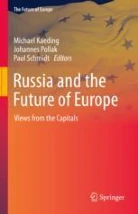Russia and the Future of Europe
Views from the Capitals
Published: 07 July 2022
Provides data on EU´s historical, financial and political ties to Russia
Includes recommendations on how policymakers should deal with Russia in the future
Presents insights from over 40 countries in the EU and its neighborhood
Part of the book series: The Future of Europe (TFOE)
This book sheds light on how Member States and EU neighbours relate to Russia. It includes their historical, financial and political ties, as well as the public perception of the national population vis-à-vis Russia. Each chapter builds on these factors to elucidate the country’s position towards Russia and provides a prediction on the future of these relations. This volume shows the diverse relations that the EU member states and neighbours have with Russia, spanning from tense and confrontational to more eased and friendly, highlighting the contrasts between the national state and the EU as a whole. The book also presents the reader with concrete aspects in different policy areas, via recommendations on how single countries and the EU should deal with Russia. Russia’s invasion of Ukraine on 23rd February 2022 will change the relationship between the West and Putin’s Russia for decades to come. No doubt that this blatant violation of International Law and the incomprehensible human suffering of Ukrainian citizens will massively change the attitude of the countries analysed in this book.
Chapter:
Abstract
Hungary has the typical national contours that feature in relations between Central and East European (CEE) EU Member States and Russia. Troublesome historical legacies, relatively minor and narrowing economic relations (except for energy) and sharp party divisions regarding the Russian nexus are generally shared features in CEE. What stands out within this setting are the inherently domestic policy patterns of bilateral relations, especially as far as interrelations between Viktor Orbán’s illiberal leanings along with Euroscepticism and Moscow’s foreign policy agenda are concerned. Viktor Orbán’s and Vladimir Putin’s mindsets partially overlap, creating some ideological foundations for an opportunistic relationship.



